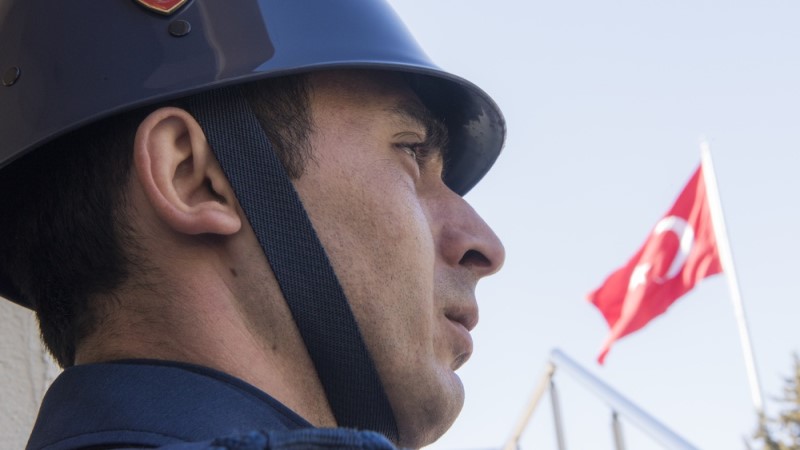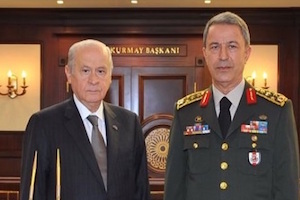Creeping Shadows: YAŞ, Hulusi Akar and the Spectre of the End of the Erdoğan Era
By Gareth Jenkins
August 30, 2021
The promotions and assignments announced after the August 4, 2021 annual meeting of the Supreme Military Council (YAŞ), which is responsible for deciding appointments in the Turkish high command, reaffirmed President Recep Tayyip Erdoğan’s control over what had once been the most powerful institution in the country. Nevertheless, in recent weeks there has been considerable speculation that a career army officer, namely former Chief of the Turkish General Staff (TGS) and current Defense Minister Hulusi Akar, is trying to position himself as Erdoğan’s heir apparent.

Turkey's Emergency Election: The Primacy of Raison d'etat
By Halil Karaveli
May 2, 2018
It is not President Recep Tayyip Erdogan’s “power hunger” that accounts for Turkey’s snap presidential and general election. Instead, raison d’état is behind this event, which will enshrine presidential rule. The abolition of parliamentary rule and the concentration of all executive powers to the presidency are designed to neutralize the Kurdish challenge. It is also intended to refurbish the authority of the state and lend it a renewed aura of strength after it was torn apart by the Gülenists. Reactions to Turkish developments should not be based on interpretations that neglect the primacy of the state’s interests and the impact of the Gülenist threat and Kurdish challenge.

Myths and Mysteries: Six months on from Turkey’s Curious Coup
By Gareth H. Jenkins
January 26, 2017
Six months after the failed coup of July 15, 2016, many questions still remain unanswered. Disturbingly, most can no longer be asked. Amid the purges, imprisonments and oppression, Turkey has become a country that is devouring itself.
Mumcu: Turkey’s ruling alliance: Erdoğan, the military and big capital
Özgür Mumcu in Cumhuriyet notes that the presence of the chief of the general staff, General Hulusi Akar, as a witness as the wedding of Sümeyye Erdoğan, the youngest of President Erdoğan’s daughters, provoked angry reactions among those who – like betrayed lovers -- are used to pinning their hopes on the military. This is not a meaningful reaction, but apparently we needed a wedding picture to realize what the power structure looks like. It was the military-industrial complex that posed for the wedding picture. This is the situation of the military that some hope so much from. And the same goes for the “Istanbul capital” that again, some expect will provide salvation. These capital interests are standing in line to get defense contracts (from the state). Erdoğan, the military, big capital and MHP form a united front. The wedding picture is instructive: it reminds that democracy will not come with the help of big capital and the military. Erdoğan, capital, the army and MHP are hand in hand. Had the laws about contract labor passed so easily if it hadn’t been for this alliance? The power relations are as easy to read as an open book: A united rightist bloc, behind it big capital, and the military as its assurance. These are all well-known themes for the left, for a left that once again needs to bring back class to the center of the political agenda.
Özkök: it's called the Republic of Turkey, not the Turkish Republic
Ertuğrul Özkök in Hürrriyet writes that the speech that the new Chief of the General Staff Hulusi Akar delivered on Victory Day August 30 is the most interesting one in recent years. Reading the speech, I noted many interesting things – the rise of the references to being “Turkish.” The expression “Turk” is mentioned in fourteen different places. The definition of the “Turkish hearth” is made in especially stark terms: The speech states that the battle at Manzikert in 1071 confirmed “Anatolia as the Turkish hearth.” And the most notable expression is the way General Akar refers to our state, as “Turkish Republic.”. I looked up the constitution at the official site of the Grand National Assembly of Turkey: There, the official expression reads “The constitution of the Republic of Turkey…” In our system, in two very important places, the expression “Turkey,” and not “Turkish” is employed: “The Grand National Assembly of Turkey” and “The Republic of Turkey…” And that is indeed very right.



